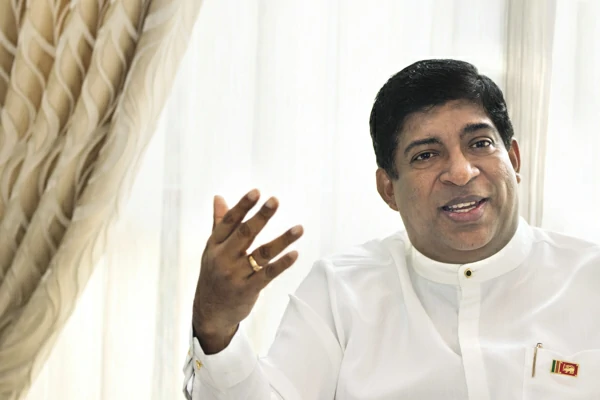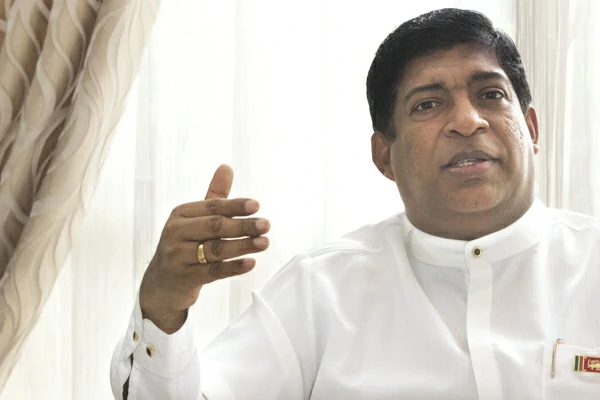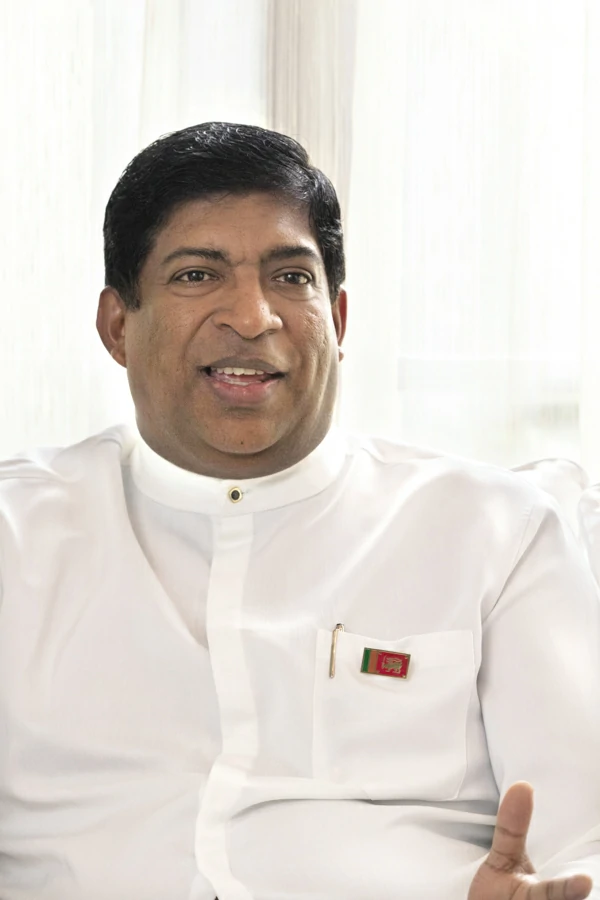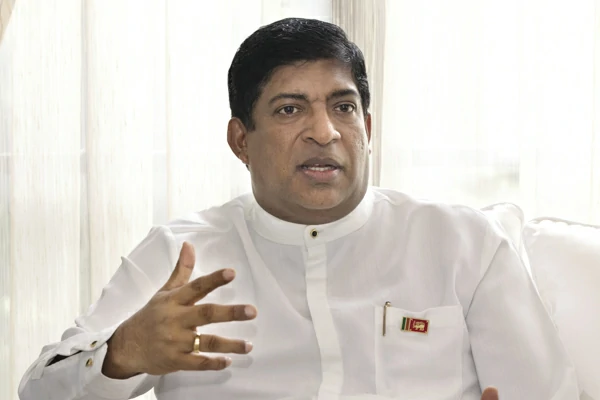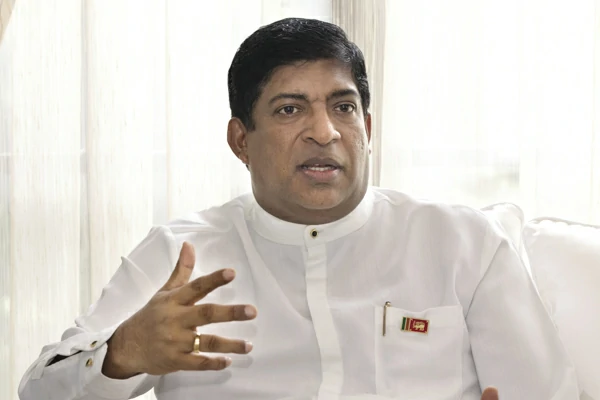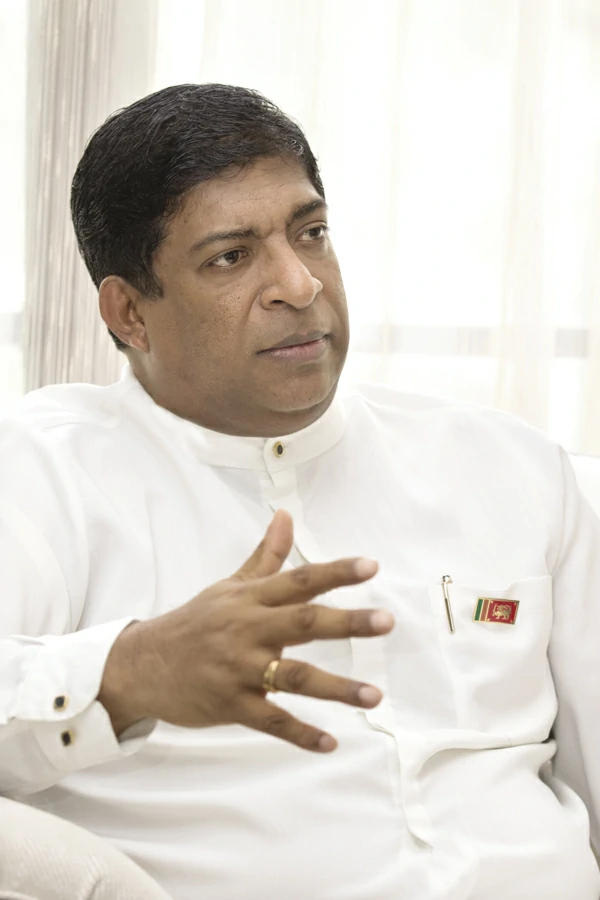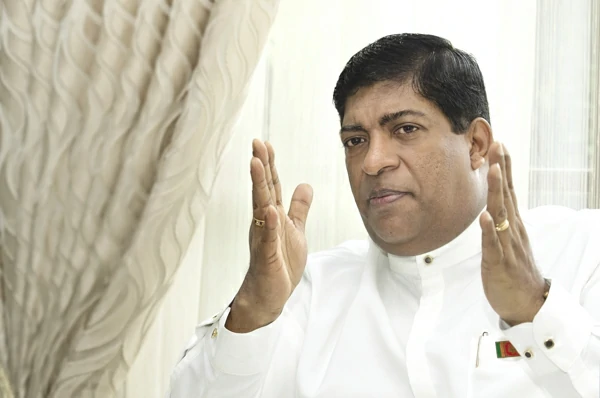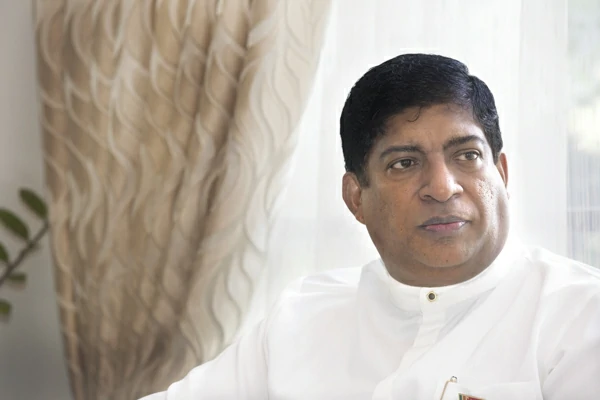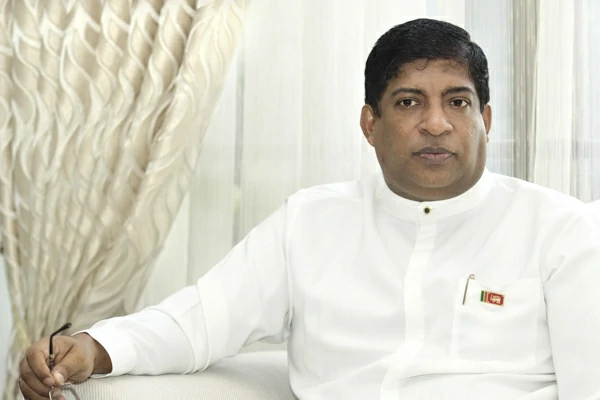
The first budget of the new government is a progressive and forward-thinking one that has essentially opened up the economy to create more activity and vibrancy, putting Sri Lanka on an equal footing with global economies.Ravi Karunanayake, Minister of Finance, is clear on the direction of the government and is vocal on the need for both the public and private sectors to wake up and realise their full potential. It is time for Sri Lankan businesses, both public and private, to grow up and not expect the government to safeguard their interests. The Minister stresses that all need to keep in mind that at the end of the day it is the tax-payer who is affected by the actions taken. He therefore asks that all work together to take the country forward.
By Udeshi Amarasinghe | Photography Mahesh Bandara and Isuru Upeksha
The 2016 budget saw the government articulating their economic direction where the barriers that restricted the free movement of the economy were removed. Can you elaborate on this?
The 2016 budget is progressive and growth oriented while keeping the younger generation at the forefront. It was formulated in a manner so that the budget proposals are rolled out yearly. We gave priority to the removal of archaic laws, which have basically retarded the growth of the country, and adopted a very positive and forward-looking approach.
We showed that the Sri Lankan investor is the priority. We gave all the opportunity for him to develop himself and acquire the technical know-how. If there is a gap, we have ensured that direct foreign investment can come into the country in line with national policies. We basically rectified the anomalies that were there and placed Sri Lanka on the starting block to take off on a fast track, and in the process we showcased Sri Lanka as a business trading point.
We simplified the taxation structure so that it is affordable where people will understand that taxation is a requirement and it is ethical to make payment for the progress of the country.
The reforms will not only foster private sector economic activities but will ensure their positive role in the entire economic process. How will this be achieved?
We have provided an even playing field for the private sector. If we say that the private sector is in the driving seat, they must have unfettered powers to get to their destination without having road blocks at any given moment. Our private sector also includes the small and the medium, and the micro, which are very vibrant businesses. We have introduced meaningful proposals where businesses are not exhorted.
The small and the medium had many issues; even though the intrinsic willingness and the capability were there, it was difficult for them to secure the financing. We ensured that they received that support. The banks were instructed to assist these SMEs. We said that the lending facilities should be catered to them. The general tendency of the financial institutions, especially the banks, is to make a huge amount of money during sunshine but no sooner does it drizzle than they take the umbrella back. We gave them the confidence to go forward and assist the SMEs. From that perspective we also looked at the larger businesses. It is also essential that while they are Sri Lanka oriented, their services and products should also go overseas. We will encourage them, support them and fortify them so that they can be competitive in the global market.
The biggest issue was the entry cost. I do not need to labour the point by going into the past. It was a very prohibitive entry cost. Sometimes the cost of entry was greater than the investment itself. Today, the entry cost is at a minimum and the outcome of a proposal will be known within
50 days. That is the spirit that we are working on.
The budget looked at addressing the structural weaknesses of the fiscal sector. Can you elaborate on this?
The biggest problem that we had when we inherited the economy – I use the word ‘inherited’ because when we came into office, a budget was already in place – was that the country’s revenue was insufficient to meet the debt servicing. We had a revenue to GDP of about 17 per cent in 2005 that reduced to 10.41 per cent in 2014. Likewise the recurrent expenditure was going up the escalator, while the revenues were going up the stairs. The gap was massive and the budget deficit was increasing at a rapid rate.
The 2016 Budget Is Progressive And Growth Oriented While Keeping The Younger Generation At The Forefront. It Was Formulated In A Manner So That The Budget Proposals Are Rolled Out Yearly.
For these reasons we looked at fiscal consolidation where we will increase revenue and reduce costs while making what we do more meaningful. We looked at four areas: the internal rate of return should be worthwhile, cost benefit analysis, optional cost, and zero base budgeting which basically brings you to say, “Yes: I require this expenditure.” While these have not been fully embraced as yet due to time constraints, these will be in place by 2017.
The next most important thing is the limited resources divided among the unlimited wants. Therefore, we looked at the best way possible of meeting the particular requirements.
There are many hallmarks in the 2016 budget in terms of the deficit – firstly, it has passed the revenue mark of 5 billion rupees; secondly, the recurrent expenditure is met by the revenue of the country, which has never been there before; and, thirdly the entire budget deficit is of capital expenditure. Even if there is a deficit, it is for the revenue that is generated in the future. Those are the hallmarks of changing the economic direction. Previously, even for salaries and debt servicing, the country was borrowing. It was a situation where you were stealing from Peter to pay Paul. That has changed.
The government aims to achieve a revenue target of 17 per cent of GDP by 2018. How will this be achieved?
I would like firstly to thank a couple of hardworking government officials. If you look at the excise department, when we inherited the economy in January 2015 the monthly revenue for November 2014 was 2,900 million rupees. Today, we are collecting almost 11,500 million rupees – that is a five-fold growth. We have been able to establish a clean government. There are no political interferences and everything is moving on a fast track. Revenue is being generated and expenditure incurred in a very clean and transparent manner. We are taking all the distortions away.
Can you elaborate on the changes in the tax system?
The tax system has been very punitive for a long time. There were 47 taxes and levies, which we have reduced to about 20 taxes. The cumbersome Inland Revenue tax file documentation will be reduced to one page and will be filled in by everyone. In the process it will be clear for every individual what their income, expenditure and 15 per cent of tax amounts to. The calculation is very simple – if not, tax planning is required.
Look at the PAYE of the private sector. The private sector constitutes about 90 per cent of the workforce and they basically take what is given. They do not demand anything. Everyone talks about the government sector, which is just 11 to 12 per cent of the workforce and they are asking for pensions, car permits and other such benefits. Therefore, we deemed that it was right and fit to make the PAYE a more meaningful proportion of the income. The PAYE had two systems in order to accommodate the poor tax-payer who was neither here nor there. To simplify the PAYE tax system further and to improve compliance, amendment to the law applicable to PAYE tax was proposed to ensure equal treatment for all employees. The increase of tax-free annual threshold to 2.4 million rupees was also proposed, with taxable income above this limit including all of the earnings by the employee to be charged at a uniform 15 per cent. This method and rate will be applicable to individual income earners in place of the present progressive rate of up to 24 per cent. Income from secondary employment will also be taxed at the same rate. This gave them a good future and companies can afford to pay and not feel threatened by the taxing. Also, when you pass the threshold of 200,000 rupees, it is honourable for a person to make payment and be part of the government’s progressive planning for the growth of the country.
Even with corporate tax we looked at 15 per cent and 30 per cent. The taxation structure is very rational. We looked at corporate taxes in two parts – that is, the financial services tax and the so-called sin taxes – tobacco, liquor and casino. We pushed those to 30 per cent and for the rest, a flat 15 per cent. This makes tax declarations much easier. Your assessable taxes are known and exemptions are included as well. There was a perception that everything was exempted.
I feel that we have given the correct perspective to the world, where we clearly state the income and deductible expenditure so that there is no distortion. Some of the multi-lateral financial institutions fashionably say that they have given numerous exemptions. I do not think this exists now. We have to be fair on the Sri Lankan public, where it is affordable, practical and attainable.
Various fees have been introduced in terms of motor vehicle accidents, maintenance, cash transactions, dual citizenship and residence visa. What was the thinking behind this?
Sri Lankans who migrate for various reasons, whether it be Sinhala, Tamils, Muslims, Malay or Burghers, they come back to their natural home. They left the Island for various reasons. We asked them to come back to Sri Lanka and be part of the economic journey. That was the reason that we reintroduced the provision of dual citizenship.
I Feel That We Have Given The Correct Perspective To The World, Where We Clearly State The Income And Deductible Expenditure So That There Is No Distortion.
In terms of the fine for motor vehicle accidents, there are about ten to fifteen accidents per day and the damage caused to public property has an impact on government revenue. When a person crashes into a lamp post that has been put up by the government with great difficulty on tax-payers’ money, there is a cost involved. The public cannot bear a person’s negligence or recklessness to be paid by those who do not own vehicles.
This system is in place in expressways, so why can’t we implement the same on the roads? We don’t tell people to meet with accidents. If you do, please pay for it. That was the basis that we went on. The rationale is that if there is consumption then you have to pay. That is the rationale.
There is quite a bit of debate regarding the change in the benefits of government sector employees such as the vehicle permit. Can you tell us the reasoning behind this?
To answer that in the most positive way: what have we removed? Nothing. We have only rationalised and targeted the benefits. There are government servants who are entitled to these benefits because they earned them but there was another segment that was highly politicised due to absolute corruption in the past few years, to show that there was a divide. In 2011, about 8,000 vehicles were given to satisfy one area. There was manipulation. We lost 210 billion rupees for 35,000 vehicles from 2010 to 2015 October. It was just not affordable. What we basically did was looked at the cash value that was lost to the country. We deliberated on permits and said that they will be entitled to a cash grant that will offset their benefit that is accrued into the permit. The cash grant will be according to their respective income.
It is only one group that is making an issue saying that we are depriving them. I am asking them, “Depriving you of what?” We have 1.4 million government servants in the country and only 4,000 people get the benefit and they are making a noise. All the problems that are created are government sector oriented. The government sector employees are saying to add the pension and loans on to the main salary. All these demands are by the government sector. If anyone coming tomorrow is told that they will be on a voluntary pension scheme, they will have a problem with that as well. You cannot satisfy them, because they have a problem regardless of whether something is removed or added on. They sit and judge.
There always has to be a rationale behind every decision. This is the only country in the world where you have benefits from birth to death, and a minority pays for the majority. That is the reason here. Sometimes people who own luxurious vehicles also get a bread subsidy and a dhal subsidy. I mean, where on earth do you get this type of thing in the world? They basically sit in judgment and the poor innocent voter that doesn’t even get two dollars a day, which is 60 per cent of the market, is impoverished owing to the greed of a small segment of society. This needs to be corrected.
There Always Has To Be A Rationale Behind Every Decision. This Is The Only Country In The World Where You Have Benefits From Birth To Death, And A Minority Pays For The Majority.
In January when we were elected to office we gave 14 subsidies. Gas prices were reduced by thousands of rupees. We reduced the prices of essential commodities such as sugar, canned fish and milk. Then the rates of utility bills such as electricity as well as fuel prices were reduced. Everyone has that benefit but when we introduce an emission tax of ten rupees per day they are all up in arms. Usually the complaints don’t come from people who use vehicles but from those who don’t even own a bicycle. This is the hypocrisy that is there in the unions that are basically controlled by just a handful of people who have lost power.
Price stability was maintained by reducing the prices of certain essential commodities and introducing special commodity levies for selected items. Can you elaborate on this?
The special commodity levy balances local production and foreign imports. If and when there is a requirement for domestic production, we impose this special commodity levy in order to balance the producers. This has been fairly effective and I must give credit to the former government for this, and wherever possible we have taken the positive elements forward. Again, we have focused on removing the distortions. Take paddy for instance – we are a rice-growing nation but we pay almost 80 to 90 rupees for rice, when the same can be imported for a lesser price. We have to protect our farmers – that is necessary – but to what extent? I leave it to you: if you can import rice for 35 rupees and our own rice is 80 to 90 rupees, then there is something wrong somewhere. That is the price we pay to protect the farmer. Does that mean that we have to do everything? You have your cost of production increasing, there is the fertiliser subsidy, then input cost. At the end of the day you pay almost 95 billion rupees as subsidies for rice. Likewise for potatoes, where we have 20,000 farmers. We pay a local producer 85 rupees when it can be imported at 25 rupees. I am not saying that everything has to be imported: quite the contrary. We are working on the basis that by 2018 the importation of potatoes, onions, soya, maize and chillies will stop. We are a firm believer of that. But at the same time Sri Lankan producers should look at the cost of production and be comparable with other nations that are producing the same at a lower cost. Sustainable agriculture must be made into commercial agriculture – that is, agribusiness – by 2020. That is our goal.
The budget also focused on the various sectors of the economy. What are the main issues that were tackled?
The Sri Lankan economy consists of three sectors. One is the services sector, which is about 60 per cent of the economy. We have given the tourist sector a huge impetus to perform. We have revolutionised the banking sector. Sri Lanka was ahead of many countries 20 years ago; we lost that opportunity to the regional peers. We once again brought it back to a focal point where we gave the banking sector the opportunity to showcase their ability to service not only Sri Lanka but the region. We are a member nation of SAARC, which is home to 25 per cent of the world population – that is a strength. Without looking out, we should focus on attracting the banking services of other countries to Sri Lanka and the region.
We Are Working On The Basis That By 2018 The Importation Of Potatoes, Onions, Soya, Maize And Chillies Will Stop. We Are A Firm Believer Of That. But At The Same Time Sri Lankan Producers Should Look At The Cost Of Production And Be Comparable With Other Nations That Are Producing The Same At A Lower Cost.
We removed all the archaic laws. We removed the many controls that were there on foreign exchange. We are looking at the possibility of bringing in a foreign exchange management agency to Sri Lanka. We have removed restrictions on sending and receiving money from abroad. We will be similar to Singapore or Dubai where we will provide banking facilities for foreign accounts. We have to give these clients comfort. Singapore and Dubai have people investing in their country at negative growth. The client pays the bank to keep their money. Why would you want to do that when Sri Lanka is giving 200 per cent return on current accounts? The rationale is that we are currently borrowing from foreign countries on bonds at 4 to 5 per cent. But if people deposit their money here they will have 200 per cent return. We are telling the world that Sri Lanka is a safe place and we have a good banking system for them to deposit their money here. The required legislations are in place as well. I must say Switzerland has supported us in this endeavour.
This is quid pro quo; a client can deposit their money in Sri Lanka, we show them their investment and the dividends with high interest rates and go forward. We believe that this will be helpful to propel the economy from a financial viewpoint. Today, almost 45 to 50 international banks want to come to Sri Lanka and have their offshore operations here. We have looked at an existing building on D R Wijewardena Mawatha, which will be converted into a facility for the off-shore operations of foreign banks by April 2016.
Education is another important sector. Then we looked at the technical sectors and how we can support them so that there is greater contribution to the economy. What we did was we brought in certain corrective measures. We gave farm gate prices as opposed to just allowing them to grow and not know what will happen next. We have built warehouses and cooling plants where it is necessary and meaningful. We are forming a supply chain, which was non-existent in the country previously. We have taken measures so that crops are protected during periods of bad weather where we have sufficient provision to provide for the people.
With regard to the industrial sector, we have removed all distortions and punitive costs that were there. We have focused on creating greater efficiency. Customs were modernised and a single-window entry was introduced so that one entity covers all the institutions that are required for clearing. These are some of the things that we want to do and we call upon the people to take the opportunity and go forward. That is the vision of President Maithripala Sirisena and Prime Minister Ranil Wickremesighe because the entire budget is based on their policy direction and statements.
This budget also saw the separation of the banking sector with leasing facilities and there was more focus on the consolidation of financial institutions. Can you elaborate on this?
When a person comes to apply for a banking licence, they pay 25 billion rupees for a banking licence, not for a leasing licence nor for pawning. The easiest and quickest thing today for a person when they run into financial trouble is to pawn their valuables. Because of the need of the moment to get money, a person agrees to pay large sums as interest but they are unable to do so and they get caught in the trap. We are telling the banks not to concentrate on pawning because that is the worst thing that is there.
The banks should decide the areas in their lending portfolios and understand what they are trying to do. Only six per cent in leasing is done by the banks. But they think that leasing is banking. Banking and leasing are two entirely separate industries. We have to drive them in the correct direction and lead from the front; take banking to areas where required and ensure that the country gets what it deserves.
With regards to financial institutions, we have an alarmingly dangerous situation. We have too many players in a small area. They have come up for reasons that we don’t know. We are looking at consolidation of financial institutions because some of them are not in very realistic focus areas but I do not want to comment too much because these are investor-driven institutions. However, the Central Bank will regain its supervisory role and be in command from this year.
Previously it was the mouthpiece of the government. You basically had political dictates being issued by an independent supervisory body. Now the situation has changed and the Central Bank will play the supervisory role that it was established for and go forward from there.
We Removed All The Archaic Laws. We Removed The Many Controls That Were There On Foreign Exchange. We Are Looking At The Possibility Of Bringing In A Foreign Exchange Management Agency.
Has protection been removed from certain industries?
In every country there is a need to protect domestic industries while encouraging competition. What we had in the tile industry was a protective element of 283 per cent. What we did was we took the distortion away. We brought this rate down to 125 per cent. That is more than enough for any industry. Likewise farmers were given guaranteed return of 75 per cent. The farmers’ production of rice is about 23 to 24 rupees. We have ensured that they have a price of 38 to 40 rupees. In the industrial sector it is the same. The steel industry has to go through a corrective process. The cement industry is being pushed to give competitive prices. We have opened up the tile and steel industries and the cost of construction has gone done by 20 per cent. That was the reason. Otherwise you have one or two companies protected and your cost of construction going up by 10 to 15 per cent, which was a meaningless expenditure. The cost of construction in Sri Lanka is higher than that of the Maldives. They are able to build cheaper than us. There was a distortion and we have rectified that.
The tea industry has been stagnant for too long. This industry employs two million people but tea export revenue has been only 1.6 billion rupees for the past 20 years. So when we try and look at a different innovative approach, there is resistance. We had a very healthy discussion with the tea producers and exporters recently. My colleague, Navin Dissanayake, was also there and this meeting gave them the opportunity to express their views on the new ideas that the government had. Previously, the perception was that if we open the market then low quality tea will come into the country but that is completely contrary to the truth. Today the Ceylon Tea name is disappearing. Even in the UK where we had a 53 per cent market share, this has gone down to three per cent. But with veterans such as Harry Jayawardena, Merrill J Fernando and Anselm Perera coming with their ideas and the new innovative younger generation also articulating their ideas, by putting all of these together, there will definitely be a new approach.
This government does not want to do anything without the consent of the industry. There is no point in governing for the sake of governing unless the industry is with you.
What about the tourism industry. Do they always expect the government to promote?
Everyone thinks that tourism is the buzzword. Yes, it is a good industry, but they must be led with the same sense of reciprocity. They want roads, airports, electricity and all other facilities for nothing. They are not willing to pay even one per cent when they are asked how much they are able to pay in taxes. But we do have committed people who are taking the industry through.
In Every Country There Is A Need To Protect Domestic Industries While Encouraging Competition. What We Had In The Tile Industry Was A Protective Element Of 283 Per Cent. What We Did Was We Took The Distortion Away. We Brought This Rate Down To 125 Per Cent.
Without lamenting on what is not available, the industry should look at what is available. We are a very responsive government. The budget that we presented received 1,898 proposals and we met all of them. It was a bottoms-up approach and when a proposal is brought in and there is a public debate, the people who
actually made the proposals oppose and are now saying that it is different. They do not have the spine to take it through. But we are a courageous government and we will take the economy in the required direction.
We had J R Jayewardene, N M Perera and Ronnie De Mel making massive structural changes, and in the international scene, Margaret Thatcher, Ronald Reagan, Bill Clinton, Mahathir Mohamad, Lee Kuan Yew, Abe in Japan, and the Indian system where the Gandhis made a change in their culture. You have to dare the system and see things happening. If you do not lead, then everyone will be just followers and it would be akin to the blind leading the blind. If you have a direction and a target then you move towards that. We have to drive the economy and have the courage and the conviction to lead it from the front. This is how you make changes.
What about the cess funds?
The cess was set up to develop certain industries, but what happened previously was that the cess fund was utilised for the glorification of certain individuals. The Tourism Board and Tea Board cess funds had been used for overseas travel without a purpose. You had kingdoms within kingdoms. There is one consolidated fund and one contingency fund and all funds come into that. There were 74 funds created in the last 20 years, which were controlled by individuals. These need to be corrected and brought under one. It is customary that Parliament controls such funds, so bring the consolidated funds to Parliament and if you spend out of that then you are accountable. Certain people want the freedom to spend as they please without the approval of Parliament. Then they question as to why they should not spend. They should realise that this is the people’s money, not their personal fund.
We Have To Drive The Economy And Have The Courage And The Conviction To Lead It From The Front. This Is How You Make Changes.
What will be the future of government entities such as SriLankan, Mihin Lanka, CPC, CEB, SLT, Mobitel and Hilton?
These will be commercialised and properly maintained. The cavalier style of management will be eradicated. If you look at SriLankan, they flew all over the world to fulfil the need of one or two people and sacrificed the taxpayers of this country. Last year, there was a loss of 34 billion rupees in 2014 for what? Just to say that SriLankan is flying the world and just for the glorification and pomp and pageantry of a few people who are non-existent today? You can’t even find them. It is this reckless style of management that needs to be corrected.
The CEB will be modernised and protected. There is no intention of privatisation. These are the wrong messages that are being communicated. Commercial banks will be made more commercial where state banks will have a competitive element. The two state banks mainly have government business and 95 per cent of the profits are from government-owned businesses. The sense of competitiveness is not there. The tax-payers are essentially paying for it. If you look at the savings, they pay 3 to 4 per cent, which is hardly sufficient. You must ensure that you have a better spread between the two. This is the reason we have looked at the human element and introduced for senior citizens 1.5 million rupees at 15 per cent. Where in the world would you get such a return? But we thought that was necessary because the banking sector was absolutely impacted with high lending rate but low saving rate. We have given them this opportunity.
Hilton is a non-strategic investment, which was thrust upon us. The government does not need to manage hotels to run the country. How can a Hilton fashion an economy? Then, there is the Hyatt Regency, which was a private entity that was targeted by some corrupt politicians who took it over under the appropriation bill and suddenly Sri Lankan Insurance was paying a rate that was so low that the real investors, whether mismanaged or otherwise, could have easily survived if they bought it at the correct market price. Every element that the previous government brought over was corrupt. The construction of the building cost 35 billion rupees when the actual cost of construction was 10 billion rupees. We still don’t know the details of the agreements.
The CEB Will Be Modernised And Protected. There Is No Intention Of Privatisation. These Are The Wrong Messages That Are Being Communicated.
SriLankan was the same. They bought aircraft to fly 15 hours when our destinations were ten hours. These are the things that are irrecoverable, unpardonable, and were done with full of zeal only to line certain individuals’ pockets, nothing else. I am sad that they have still not been brought to book.
With Mobitel, we are looking at listing it in the Colombo Stock Exchange. It is government owned and when you list it in the stock exchange, all actions are transparent and they will be able to compete on an even playing field.
What about existing infrastructure projects such as the airport and port? What will be the future?
The harbour that was initially planned in the south was for a deep port harbour, which is for ship repair, ship construction, ship breaking and deep sea bunkering. That was the intended role of the harbour in the south. You build a harbour for a specific purpose, but what happened was that the Hambantota port was built with the aim of targeting container movement but that route was already established for the Colombo Port. The Hambantota Port cost 220 billion rupees, and the return is almost equivalent to the value addition, which is about 400 to 500 million rupees a year. I heard my colleague Arjuna Ranatunga saying that the annual payment is 9,500 million rupees a year. When you have 400 million value added and the payment is 9,500 million, how are you going to fill the gap? The balance of 9,000 million is essentially coming from the Colombo Port.
We have Colombo Port that is making money but in the process we have Kankesanthurai, Galle and Trincomalee, all of which are not making money. So you have ports upon ports, but there are only a limited number of ships.
With Mobitel, We Are Looking At Listing It In The Colombo Stock Exchange. It Is Government Owned And When You List It In The Stock Exchange, All Actions Are Transparent And They Will Be Able To Compete On An Even Playing Field.
Then you have the airport in Mattala, which has been built at a cost of 48 billion rupees and we have more peacocks landing than aircraft. What is the purpose of building an airport without a proper plan? We have not stopped anything but we are putting emphasis on capital expenditure, which will generate revenue for tomorrow. Expressways are moving at the same pace. Housing has got an allocation that has never before been seen in the country. Health expenditure has gone up to 3.74 per cent of GDP, education to 5.4 per cent of GDP. Tourism is picking up and private sector hotels are being built. Everything is moving.
No other leader has had that egoistical leadership as in the previous regime. If you look at D S Senanayake, Dudley Senanayake, Sir John Kotelawala, J R Jayewardene, R Premadasa, D B Wijetunga, their style of governing was very different and modest, and even from the SLFP, S W R D Bandaranaike, Sirimavo Bandaranaike and Chandrika Kumaratunga Bandaranaike. They had no vanity in their leadership. Sri Lanka basically has a public debt that has gone up from 1,784 billion in 2004 to 8,990 billion today, which is a five-fold increase. For what? Has your income gone up? Have your reserves gone up by that time? No. We have gone for high public debt where our spending is 6 to 7 per cent as opposed to 1 to 2 per cent. Because we are unable to service debts, which is an alarming situation. But we were able to rectify this with the will of the people who brought in the changes at the correct time.
Is there light at the end of the tunnel?
Yes, most definitely. Not merely a light: you will see a floodlight, because we have certainly brought in a sense of purpose and a clean government. This in turn brings about clean management and benefits to the people. Today you are seeing that. There is a wave of union activities, simply led by a bankrupt group that sees that there is no tomorrow for them and if you don’t obstruct them then they basically have no chance. The strike was a miserable failure because they simply put the wrong foot in the wrong place.
The people believe the new government, which is led by the two major parties – the United National Party and Sri Lanka Freedom Party. So when both parties are together working towards a common goal, then who are you opposing? The problem in our country is that there are some people who like communism.
They know the problem, they dance around the problem but they don’t solve the problem. That is what they do. It is aimed at the rulers because they are surprised at how we are tackling all the issues.
The open economy is one of the best examples. J R Jayewardene opened the economy in 1978 where Sri Lanka became part of the world. There have been a number of governments after that and though they keep blaming the open economy, they did not do anything to change it. It is the classic case of cursing the darkness without assisting to light the candle so that you can see the light at the end of the tunnel. We have created that and we ask the people to have confidence in us.
Being more market oriented, will we see privatisation in sectors such as health, education, agriculture and other areas?
No, you won’t have privatisation as the panacea for all failures. You will only have the private sector having public-private partnerships. We want the government to compete with the private sector and give the consumer the best. It is a misnomer that there will be privatisation just because the economy becomes more market oriented. Every Sri Lankan loves their motherland. We are looking at what is good for Sri Lanka, for the consumer. We want to eradicate corruption, not foster it. It is how we maximise the limited resources that we have in the country for the maximum benefits.
What about the appointments to various government positions. Are the right people in the right place?
Certain questionable appointments have been made due to the lack of leadership in public service. There was much political interference and owing to that we had the government service becoming a private service. But today that is changing. I can say with pride that at the Finance Ministry, we have an excellent secretary and excellent DGs in their relevant sectors. They have been stymied and suppressed previously. We have opened up and the light is coming in. We have given opportunities in other areas as well.
We Have Certainly Brought In A Sense Of Purpose And A Clean Government. This In Turn Brings About Clean Management And Benefits… We Ask The People To Have Confidence.
The President and the Prime Minister are driving the country in a different way. The process of change needs a little time. But we know that we will have a better tomorrow.
I hope that the Supreme Court will become a vibrant, independent and democratic institution, which will help to give that sense of confidence. The next area is public accountability. That is the auditor general’s department, which now has a suitable person at the helm. The independent commissions are there and we hope that this will propel a more disciplined and motivated staff.
The Director General of the Bribery Commission is working tirelessly and with a sense of zeal. But when you try to clean society you also become a victim of that. We imposed taxes on certain imports, and then suddenly we apparently become part of some ploy. When we try to bring almost 2 billion rupees in revenue into the country and clean society, you are being punished. This is a thankless society – they target you when you try to eradicate corruption.
Business Today plays a pivotal role in society in opinion making. Even though there is no right of information, I say that you are free to visit our ministries at any time. We don’t have anything to hide and you do not need an Act to say ‘right of information’. That is the right of the people and we can enshrine that. Today with one click on social media, a totally distorted picture is portrayed. They distort information about your family to tarnish your name. This has happened to me personally.
This is the level this country goes through, but this does not happen to corrupt people. They pay and play together, and they live together in corruption. But we will clean society. This is the bane of society and it has to be cleaned up.
The President and Prime Minister set up a committee so that all appointments to the ministries are routed through this committee. In this manner, no wrong appointments can be made. That clears every particular appointment and it is a fast-tracked operation that brings in a sense of moderation and a sense of purpose. Sometimes there are delays, which stem from some of these areas but now it has been fast tracked.
The government has been in office for less than a year. What are your thoughts on the performance of the economy so far?
January 8, 2015 saw the election of Maithripala Sirisena as the President of the country that basically had a 100-day programme and we completed 95 per cent of that. Then the general elections were called and then we were in election mode, and on August 17, we were elected to office. During the first week of September the government was formed. From September to today it has not even been 100 days. Don’t you think that the achievements within this this short period of time are stupendous?
What is our inheritance? The economy was ramshackle. It was something that was beyond repair. It was a grenade without a pin and was about to explode. If we look at what was happening in the world, the Chinese and Indian currencies were being devalued. The American interest rates have been increased, and ISIS is in the Middle East, causing turmoil. With all of that happening around us, Sri Lanka is in the safe zone. We have been futuristic: the President and the Prime Minister work together. This harmonious relationship has helped Sri Lanka towards a new tomorrow.
Today, in a world of doom and gloom, Sri Lanka is still spoken of. America is taking the lead because everything is attracted there but other than that, it is Sri Lanka, Myanmar and Vietnam that are coming up. Today, Sri Lanka is being profiled well. We have corrected the errors that we inherited and repositioned Sri Lanka globally. Forbes magazine in its 2015 ranking has placed Sri Lanka 91 out of 144 nations where China is 94 and India 97.
What are the immediate changes that we will see in the New Year?
My belief is that you will have a completely new culture, financial structure and a new sense of purpose because we have a different approach. There will be a friendly Inland Revenue department, with customs and ministries that are working together with a zero base budget, which means you basically have to ask why you are making a certain expenditure. That sense of purpose is coming back to the system. We hope that the world will not have an economic slide or turbulence, which will retard growth.
We will take the economy to take-off mode and attract investments into the country. We see a larger amount of remittances coming in. There are people in Switzerland, Asian region, Middle East and the EU who are taking advantage of the opening up of the exchanges in the country. There are investments coming in because we have removed the barriers, but we are also controlling. It is not a haphazard growth, it is a planned growth.
The President and Prime Minister have been very focused on their respective areas. It is not whether we can develop this country or not – it is whether we want to develop this country or not. That is what is causing a lot of concern.
Today, Sri Lanka Is Being Profiled Well. We Have Corrected The Errors That We Inherited And Repositioned Sri Lanka Globally.
Textiles is another classic example. We saw a push in the direction of opening out to the world, with greater market access and free trade agreements with a focus on the region, USA and EU. We suddenly have a market that was dormant breathing life again. We have had positive discussions regarding the reinstating of the GSP plus, while a free trade agreement with the USA is something in the offing. These are things that are driving the country to a sense of direction that will help us to create a vibrant economy.
What are your final thoughts?
If I can be the voice of the voiceless and be the main instrument that would take away hatred and poverty. That alone I would consider as my greatest achievement.
I call upon all Sri Lankans: our citizens, this is your time. We are temporary leaders in the country’s economy that we are directing for your betterment. Come forward, as I said. Ensure that you light a lamp and do not curse the dark. Together we can make a difference. We have to be innovative enough to think of the unthinkable. Dream and make dreams a reality and not just be a day-dreamer. That is how nations have become strong nations. This is the best time. We embrace all communities, whether it be Sinhala, Tamil, Muslim, Malay or Burgher, and all religions, Buddhism, Christianity, Hindu, or Islam. This is our social fabric that makes Sri Lanka a very vibrant society. As a result, let us all pull together. Let us put the past behind us and walk together in strength to our unborn future. We should take regional leadership into our hands. From history we know that Sri Lanka was a point where merchants travelled through, so let us make Sri Lanka that hub again and ensure that we have a revolutionary change that we are back on the world map and through that, increase the value of citizenship. Together, let’s make that difference.
I Call Upon All Sri Lankans: Our Citizens, This Is Your Time. We Are Temporary Leaders In The Country’s Economy That We Are Directing For Your Betterment… Together We Can Make A Difference.
I call upon the private sector as well. I know that Business Today is doing a lot to recognise talent in Sri Lanka by selecting the best 25 companies. This is certainly providing the correct direction. I call upon you to select the best government institutions as well. I also appeal to the private sector: do not be lethargic. Be innovative: don’t wait to give excuses. During the elections, you said, “We have to wait and see what the outcome is going to be.” When the elections were over, you said, “Let’s wait and see till the budget is presented.” Well, now the government and the budget are in place, and consistency and coherence are there. Put your mouth where your money is. That is the way to go forward. We call upon the private sector to wake up. It is a rude wake-up call. If you don’t, you will be left behind. We do not want to internationalise a domestic economy. We want our Sri Lankans to do well. Ingenuity and capacity are there. You have the willingness. You only need the conviction to march and go forward. Let’s fight the fight for the benefit of the country.
The private sector and the public sector together make the Sri Lankan economy. It is not whether you can do it or not, but whether you want to do it or not.
All problems in this world are only due to two words ‘early’ and ‘late’. We dream too early and act too late. We trust too early and forgive too late. We get angry too early and apologise too late. We give up too early and restart too late. We cry too early and smile too late. Change ‘early’ or it will be too ‘late’!
